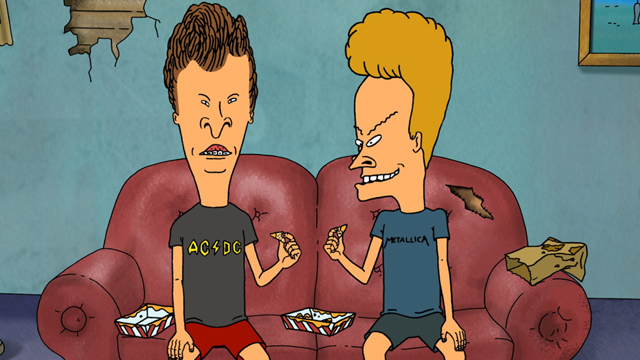I never watched Beavis and Butt-Head growing up, being too young for its target demographic. However, I did know about it, or at least the controversy and criticisms lobbed at it. Complaints about the titular duo’s reprehensible stupidity and ugliness, and how they (and everything else on their home network) represented the sloth and stupidity of The Worst Generation Ever, at least until the Millennials came along. Of course, being satire that’s exactly what Beavis and Butt-Head are: a gross exaggeration of a group’s worst qualities. However, as show creator Mike Judge recognizes that nothing exists in a vacuum, Beavis and But-Head themselves were just one aspect of a larger target, which included the adults and culture that allowed Beavis and Butt-Head to exist.
Of course, as the show was wildly popular it got turned into a movie, which might seem like a bad idea considering the show consisted of a series of seven minute shorts. Thankfully, Mike Judge is considerably smarter than his creations, and the film is a surprisingly tight riff on the decade’s favorite genre (the crime comedy). The plot is thus: when Beavis and Butt-Head have their beloved TV stolen, they start wandering around town to find it, stumbling upon a drunken criminal named Muddy (Bruce Willis) who mistakes them for hit-men. Muddy pays the pair to fly out to Las Vegas and kill his wife, Dallas (Demi Moore), though his intentionally vague phrasing of “do her” leads the teens to believe that he wants them to have sex with her. When Beavis and Butt-Head find her, Dallas uses her powers of persuasion (read: cleavage) to get the dim-witted duo to unwittingly transport a deadly virus to Washington, DC for her. What follows is a cross-country trip of epic scale and minuscule IQs, as the titular dumbbells are pursued by a pissed off Muddy and national law enforcement, led by the cavity search obsessed ATF man Agent Flemming (Robert Stack, bringing such stone-faced seriousness and righteous patriotism to his role that he completely steals the movie).
In addition to riffing on ’90s crime film tropes, Beavis and Butt-Head Do America is also a road trip variation on Being There, taking that film’s gentle ribbing of White Male Privilege a step further and turning it into a darkly comic, nihilistic horror. Despite being dumb as rocks and rather unpleasant, Beavis and Butt-Head quickly discover the world is their oyster. They get on the wrong busses without comment, are treated politely by everyone they encounter (even after being very rude), and are constantly overestimated or aided by all the (also white) adults they encounter. Muddy thinks they’re ruthless criminals, ATF Agent Flemming is convinced they’re dastardly terrorists, and a sweet old lady voiced by Cloris Leachman believes that they’re nice boys. As Beavis and Butt-Head stumble along in their journey, you’re left to wonder if they would have had the same inexplicable luck if they were black, or latino, or gay.
Yet the most damning sequence comes after Beavis and Butt-Head arrive in Washington, DC and wander into the Senate. Butt-Head finds himself in front of the microphone for the building’s PA system and announces that they’re “looking for the chick with big boobs” and that they are “ready to do [her] now.” The two nimrods utter their famous chuckle, which is then echoed by the entire senate floor. This is the other part of Judge’s satire, and the aspect most of the show’s most vocal critics seemed to miss in their condemnations. Beavis and Butt-Head are the by-product of a society constructed by Straight White Men, one that treats women as sex objects and is constantly catering to their basest desires. A culture that constantly tells them to defer to adults (teachers, cops, ATF Agent Flemming, politicians, etc.), even though they’re just as base and juvenile as the teenagers they look down on.
In this way Beavis and Butt-Head Do America is a rather scathing indictment of America’s past and its part in crafting a dire future. The adults can look down on Beavis and Butt-Head all they want, but it’s all learned behavior, and who do they think taught them?

